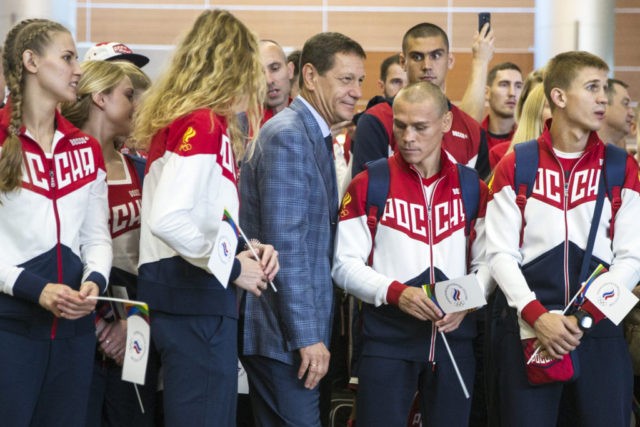The International Olympic Committee (IOC) ruled more than 100 members of the Russian Olympic team ineligible for the Rio games.
The ban pertains to nearly a third of the Russian athletes who qualified for the Summer Olympics. The forced subtractions by the IOC and the governing bodies for the individual sports featured at the games now leaves Russia with a smaller team than Australia, Italy, Spain, the host nation, and several other countries. The nation that won the most medals at the last Olympics in Sochi loses 118 of its 389 athletes in Rio.
The International Olympic Committee banned their entire track and field team. The sport of athletics similarly told the Russians to stay home. The prohibition leaves Russian weightlifters watching instead of snatching, cleaning, and jerking.
The country’s most high-profile athlete hoping to go for gold in Rio, Maria Sharapova, saw her dream of improving on her silver medal from the London games derailed when the World Anti-Doping Agency barred her for meldonium use earlier this year.
But the governing bodies for boxing, judo, fencing, and several other sports cleared the Russians to compete. In rowing, swimming, and numerous other events, governing bodies cleared some athletes and blocked others.
Some, including officials at the World Anti-Doping Agency, demanded that the IOC ban all Russians from Rio. The IOC regarded a blanket ban as guilt by association.
The ban on 118 Russians stems in large part from the revelations by a doctor-defector that the nation organized a vast doping scheme designed to boost performance and elude detection. Dr. Grigory Rodchenkov came forward after he worried about his well being after a report named him as the chemist behind the enhanced body chemistry of Russian athletes. The deaths under mysterious circumstances of two of his colleagues keeps him far away from his homeland.
The cheating involved a concoction of three drugs mixed with alcohol served to athletes and break-ins at the Olympic laboratory in Sochi that witnessed the Russians somehow tamper with the seals on the urine specimens of drugged-up competitors without anyone the wiser for it.
The New York Times reported, “In a dark-of-night operation, Russian antidoping experts and members of the intelligence service surreptitiously replaced urine samples tainted by performance-enhancing drugs with clean urine collected months earlier, somehow breaking into the supposedly tamper-proof bottles that are the standard at international competitions, Dr. Rodchenkov said. For hours each night, they worked in a shadow laboratory lit by a single lamp, passing bottles of urine through a hand-size hole in the wall, to be ready for testing the next day.”
A Russian runner also stepped forward to tell the truth about the state-run scheme of pumping competitors with performance-enhancing drugs. Yuliya Stepanova, an 800 meter runner, told all about the systematic doping administered by the state to the Russian track and field team. Because she participated in the scheme before revealing it, the IOC won’t let her compete, either.

COMMENTS
Please let us know if you're having issues with commenting.